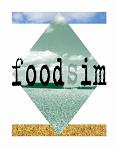
The development and use of model simulation in risk analyses, food safety, fermentation, texture and flavour of food products. How simulation models can help to manufacture a consumer-friendly food product on specs with a shorter time-to-market.; The state-of-the-art in modelling of complex food properties. This translates itself into the use of models in process and plant control. Process control based on a set of product specs by application of neural networks, fuzzy logic, cost models and mechanistic models; traceability and logistics management. These aspects are covered by the following:
Modelling and Simulation in Food Engineering and Processing
The objective of this track is to assess the state of computer modelling and simulation in food processing and engineering. Of interest are computer modelling and simulation applications conducted with the objective of improving knowledge and understanding or physical phenomena, developing software sensors, optimising systems, as well as issues in control, supervision, and failure analysis.
Therefore this track is concerned with:
(1) Applications
- Optimisation of the design of an unit operation or a process
- Optimisation of the operating conditions
- Optimisation of products (formulation)
- Real time simulation and control
- Indirect measurement, observation and estimation techniques (software sensors)
- Estimation of thermophysical properties by inverse techniques
- Condition based monitoring, Failure analysis
(2) Methods of simulation of food processes (static and dynamic)
- Knowledge driven model
- Simplification of complex models (for control or real time simulation)
- Neural networks (for modelling, control or computing)
- Fuzzy techniques (for simulation or control)
 Submit your paper/abstract proposal for the automation track here
Submit your paper/abstract proposal for the automation track here
Modelling and Simulation in Food Sciences and Biotechnology
The interactions of biological complexity with environmental parameters cannot be studied using conventional methods. Computer modelling and simulation methods offer imaginative possibilities for improving biokinetic studies, molecular investigations, bioprocess control, extraction yield or quality of final products, and risk assessment.
Simulation methods and tools will be applied to the following areas :
- Biomolecular engineering
- Biotechnology
- Biokinetics modelling
- Bioprocess control
- Simulation and risk assessment including Predictive Microbiology
- Growth and death modelling
- Predictive microbiology and HACCP Shelf-life prediction.
 Submit your paper/abstract proposal for the automation track here
Submit your paper/abstract proposal for the automation track here
Modelling and Simulation in Food Economics, Production and Logistics Management
Firms in the food industry often face short delivery delays mandated by marketing requirements.
Food products are also frequently perishable. Thus, firms in the industry need to react quickly within a flexible organization. One difficulty in rapid flexible response stems from the need to manage the ongoing production of raw material based on intermediate-term delivery schedules (for example, a poultry farms scheduled production based on future order forecasts available many months prior to the actual delivery time).
This track is concerned with a variety of research efforts addressing intra-firm and inter-firm economic and management problems across food chains.
The applications will be open to these following fields:
- production management, scheduling problems, operations management
- logistics, SCM
- industrial economics, econometrics
- traceability
 Submit your paper/abstract proposal for the automation track here
Submit your paper/abstract proposal for the automation track here
Methods and new Simulation Tools applied to Food and Bio-Industries
This track concerns itself with the methodological aspects of simulation modelling and the new learning methods by using simulation. The Action will review current state of the art on research related to the topics of : system analysis, model specification and evaluation, sensitivity analysis, metamodels, optimisation of simulation models, training and learning methods.
Problems of software tools and contributions on key concepts related to the dynamics modelling of food industry systems also will be addressed within this track.
 Submit your paper/abstract proposal for the tools and methods track here
Submit your paper/abstract proposal for the tools and methods track here











